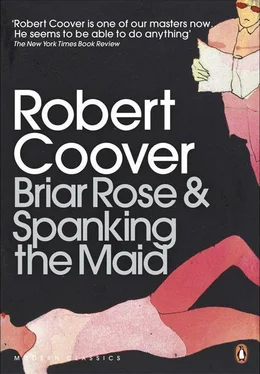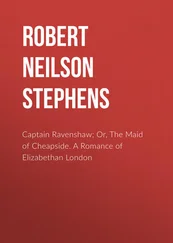The pale moonlit turrets of the castle, glimpsed through the brambles, rise high into the black night above like the clenched fists of an unforgiving but stonily silent father, upon whose tender terrain below he is darkly trespassing, heralded by a soft icy clatter of tinkling bones. Unlike these others who ornament the briars, he has come opportunely when the hedge is in full bloom, or perhaps (he prefers to think) the hedge has blossomed tonight because it is he who has come, its seductive caresses welcoming him even as the cold castle overhead repels, the one a promise and a lure, showing him the way, the other the test he must undertake to achieve the object of his heroic quest. Which is? Honor. Knowledge. The exercise of his magical powers. Also love of course. If the old tales be true, a sleeping princess awaits him within. He imagines her as not unlike this soft dew-bedampened wall he is plunging through, silky and fragrant and voluptuously receptive. If she is the symbolic object of his quest, her awakening is not without its promise of passing pleasures. She is said, after all, to be the most beautiful creature in the world, both fair and good, musically gifted, delicate, virtuous and graceful and with the gentle disposition of an angel, and, for all her hundred years and more, still a child, innocent and yielding. Achingly desirable. And desiring. Of course, she is also the daughter of a mother embraced by a frog, and there has been talk about ogres in the family, dominion by sorcery, and congress with witches and wizards and other powers too dark to name. If there be any truth in these century-old rumors from benighted times, this adventure could end, not in love’s sweet delirium, but in its pain, its infamous cruelty. This prospect, however, does not dissuade him. On the contrary. It incites him.
There is this to be said for the stabbing pain of the spindle prick. It anchors her, locates a self when all else in sleep unbinds and scatters it. When a passing prince asks who she is, she replies simply, having no reply other to offer, I am that hurts. This prince — if prince he be, and who can truly say as he/it drifts shapeshifting past, substantial as a fog at sea? — is but one of countless princes who have visited her in her dreams, her hundred years of dreams, unceasing, without so much as a day’s respite. None remembered of course, no memory of her dreams at all, each forgotten in the very dreaming of them as though to dream them were to erase them. And yet, so often have her dreams revisited fragments and images of dreams dreamt before, a sort of recognizable architecture has grown up around them, such that, though each dream is, must be, intrinsically unique, there is an ambient familiarity about them all that consoles her as memory might, did she know it, and somewhat teaches her whereto to flee when terror engulfs her like a sudden wicked spell. One such refuge is what she sometimes supposes to be a kitchen or a servery, else a strange gallery with hearth and wooden tub, oft as not at ground level with a packed earthen floor and yet with grand views out an oriel’s elevated bay. Sometimes there are walls, doors, ceilings, sometimes not. Sometimes she drifts in and out of this room alone, or it appears, in its drafty solitude, around her, but sometimes familiar faces greet her, if none she knows to name, like all else ever changing. Except for one perhaps: a loving old crone, hideously ugly and vaguely threatening, yet dearer to her in her dreams than any other, even courting princes.
Well, old crone. Ugly. Thank you very much. Has that smug sleeper paused to consider how she will look and smell after a hundred years, lying comatose and untended in an unchanged bed? A century of collected menses alone should stagger the lustiest of princes. The curse of the bad fairy, yes. She has reminded the forgetful creature of this in her dreams, has described the stagnant and verminous pallet whereon she idly snoozes and croned her indelible images of human decrepitude, has recounted for her the ancient legends of saints awaking from a hundred years of sleep, glimpsing with dismay the changes the world has suffered, and immediately crumbling into dust. Her little hearthside entertainments. Which are momentarily disturbing perhaps, causing her charge’s inner organs to twitch and burble faintly, but nothing sticks in that wastrel’s empty head, nothing except her perverse dream of love-struck princes. Or maybe she knows, instinctively, about the bewitching power of desire, knows that, in the realm of first kisses, and this first kiss firstmost, she is beautiful, must be, the fairy herself will see to that, is obliged to, must freshen her flesh and wipe her bum, costume and coiffure her, sweep the room of all morbidity and cushion her for he who will come in lustrous opulence. Alone, the fragrances at her disposal would make a pope swoon and a saint cast off, his britches afore, eternity. No, all these moral lessons with which the fairy ornaments the century’s dreaming are mere fancies invented for her own consolation while awaiting that which she herself, in her ingenerate ambivalence, has ordained.
Though proud of the heroic task set him (he will, overcoming all obstacles, teach her who she is, and for his discovery she will love and honor him forever without condition) and impatient with all impediment, he nevertheless does feel impeded, and not so much by the heady blossoms’ dense embrace as by his own arousal which their velvety caresses have excited. They seem to be instructing him that the prize here without may well exceed the prize within, that in effect his test lies not before him but behind, already passed, or, rather, that the test is not of his strength and valor but of his judgment: to wit, to choose an imagined future good over a real and present one is to play the fabled fool, is it not? Perhaps that tale the countryman told that put him all on fire to engage upon this fine adventure was but a subtle ruse to lure him to the briar hedge and thus into this profounder examination of his maturity and aplomb. All about him, the swaying remains of his anonymous predecessors clink and titter in the moonlight as though to mock the naive arrogance of his quest (who is he to seek to ‘make his name’ or to penetrate the impenetrable?) and to call him back to the brotherhood of ordinary mortals. If it feels good, do it, he seems to hear their bones whisper in wind-chimed echo of that ancient refrain, and for a moment the hostile castle turrets recede and his eyes, petal-stroked, close and something like pure delight spreads outward from his thorn-tickled loins and fills his body — but then, pricked not by briars but by his own sense of vocation, his commitment to love and adventure and honor and duty, and above all his commitment to the marvelous, his passionate desire to transcend the immediate gratifications of the flesh and to insert himself wholly into that world more world than world, bonding with it indissolubly, his name made not by single feat but by forever-aftering, he plunges forward again (those turrets: where have they gone?), wide-eyed and sword raised high.
Her ghostly princes have come to her severally with bites and squeezes, probing fingers, slaps and tickles, have pricked her with their swords and switched her thighs with briar stems, have licked her throat and ears, sucked her toes, spilled wine on her or holy water, and with their curious lips have kissed her top to bottom, inside and out, but they have not in these false wakings relieved her ever of her spindled pain. Often they are beautiful, at least at first, with golden bodies and manelike hair and powerful hands and lean rippling flanks, yet are sad and tender in their gaze in the manner of martyred saints; but at other times they are doddering and ugly, toothless, malodorous and ravaged by disease, or become so even as they approach her pallet, a hideous transformation that sends her screaming to the servery, if a servery is what it is, and sometimes they become or are more like beast than man, fanged and clawed and merciless as monsters are said to be. Once (or more than once: she has no memory) she has been visited by her own father, couched speculatively between her thighs, dressed in his crown and cloak and handsome boots and chewing his white beard, a puzzled expression on his kind royal face, as, with velvety thrusts, he searches out the spindle. In her waking life there might have been something wrong about this, but here in sleep (she knows she is asleep and dreaming, a century’s custom having this much taught her) it hardly seems to matter and in some wise brings her comfort for he rests lightly on her and softens her cracked lips and nipples with his tears or else his moist paternal tongue, whilst he attends her mother, standing at the bedside with cloths and lotions at his service and offering her advice. Over her head, as though she were not present (and she is not), they lament the loss of their only child and worry about the altered kingdom and whether it can ever be put right again. It’s that damned spindle, her mother says. Can’t you do something about it? Yes, yes, I’m working on it, he gasps as his face turns red and his eyes pop open and his beard falls off.
Читать дальше












